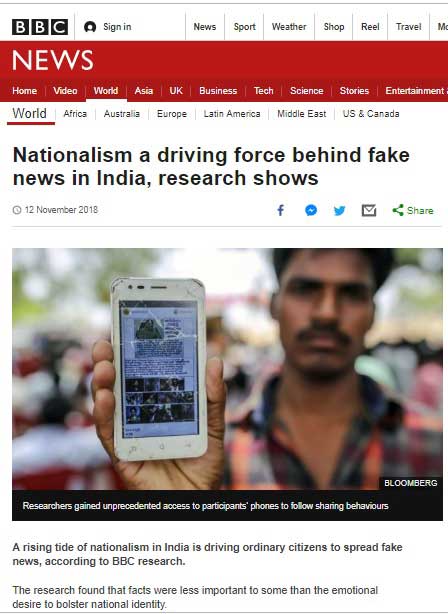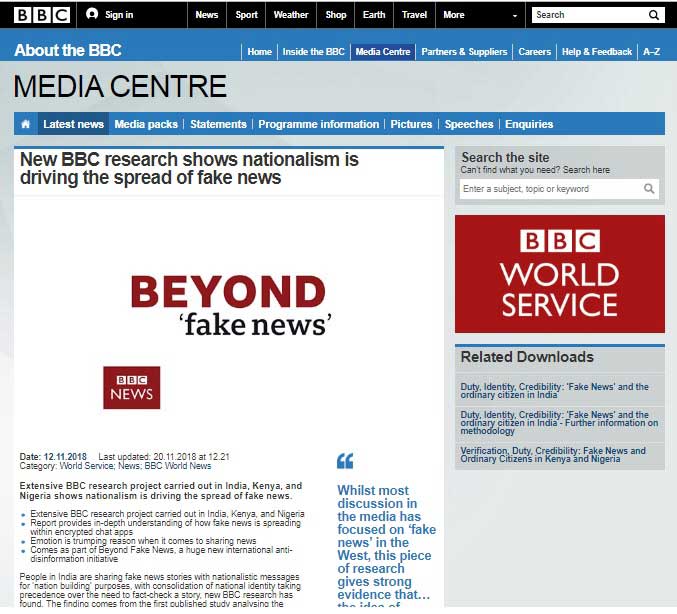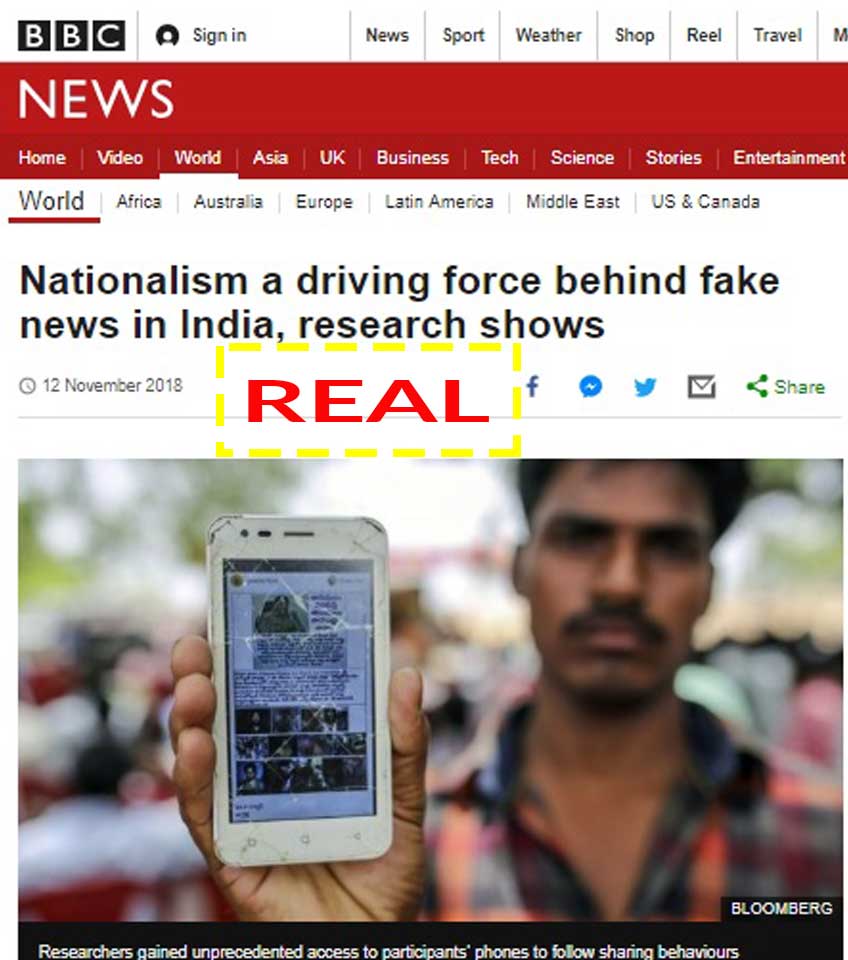Recently online a BBC research which concluded that a rising tide of nationalism in India is driving ordinary citizens to spread fake news, has created a buzz on social media and WhatsApp.

Our readers can read this BBC article here.

Our readers can read this BBC article here. And they can download the BBC research report from here.
OUR FACT CHECK
Fact Crescendo team did a fact check on this issue. We did Google Reverse Image search and researched online to track the story and comments being made on various websites and social media.
To make our readers aware of various sides to this story, we found the following:
- As per BBC, the key findings from the report are:
- In India people are reluctant to share messages which they think might incite violence, but feel duty bound to share nationalistic messages. Fake news stories about India’s progress, Hindu power and revival of lost Hindu glory are being shared widely without any attempt at fact-checking. In sharing these messages, people feel like they are nation building.
- A sense of duty is also seen to be behind the spread of fake news in Kenya and Nigeria. However, rather than being motivated by a duty to ‘nation build’, people are more likely to feel duty bound to share breaking news just in case it is true and could affect those in their networks. A sense of duty to democratise access to information is also seen to be at play here.
- The report suggests overlap between fake news and pro-Modi political activity in India. Using big data analysis of networks within Twitter the BBC has found that in India, left-wing sources of fake news are only loosely aligned, if at all, whilst the right wing sources of fake news are very closely linked together. This allows right-leaning fake news to spread faster and wider than left-leaning fake news.
- Fake news is being unwittingly spread by people across India, Kenya, and Nigeria, as they forward messages in the hope that someone else will check the truth of the story for them.
Our readers can read more about these key findings here.
- News media and experts as well as other citizens of India have questioned the veracity of this research due to the methodology as well the survey sample size used in it. Few examples are given below to illustrate this:
BBC conducts a monthly opinion poll to assess "Public perceptions of the impartiality and trustworthiness of the BBC (June 2015)". In nation with a population of 66.57 million (how many of them are BBC viewers?) its sample size is 1000).
See https://t.co/M71wh14ITc— VOXINDICA (@VOXINDICA) November 16, 2018
- Opindia has written extensively on this topic, our readers can read their articles by visiting the links below:
- BBC Research On Fake News Is Shoddy Unethical Dishonest And Actually An Example Of Fake News
- Alt News Founder Exposes himself and BBC further
- BBC Report has political bias with a Congress connection
Rupa Jha, Head of Indian Languages , BBC World Service even gave a statement on her twitter account ‘@rupa_jha’ regarding this
report:We stand by our research on #FakeNews .The report has been re-published with some clarifying details, particularly regarding the methodology. Please note that there have been NO amendments made to the original conclusions of the analysis. https://t.co/vPS3prkevD
— rupa jha (@rupa_jha) November 20, 2018
Our readers can also visit the links below for better understanding of the issue:
Economic Times The Week The Quint Boom Live Deccan Herald Hindustan Times Business Insider Daily Hunt NDTV The Wire IN CONCLUSION
Fact Crescendo team tags this as Real News. The BBC research has taken a too small a survey sample size to correctly portray the online habits of Indians. So, we advise our readers to take the conclusions of this BBC report ‘with a grain of salt’ and wait for a more detailed explanation by BBC, statistical experts or news media.
Fact Crescendo also advises & forewarns our readers to beware of any fake and biased posts or comments being shared on social media in response to this report and its conclusions.
Fact Crescendo advises its readers to visit various news media & fact checking websites online when in doubt about any WhatsApp or social media forward or post.
Dear Readers,
Do you feel that a certain story is fake? Do you know some additional factual details about a claim being shared on social media?
Then you can submit that claim or news here, for our team to verify and fact check for you.
Thanks,
-Fact Crescendo Team-





